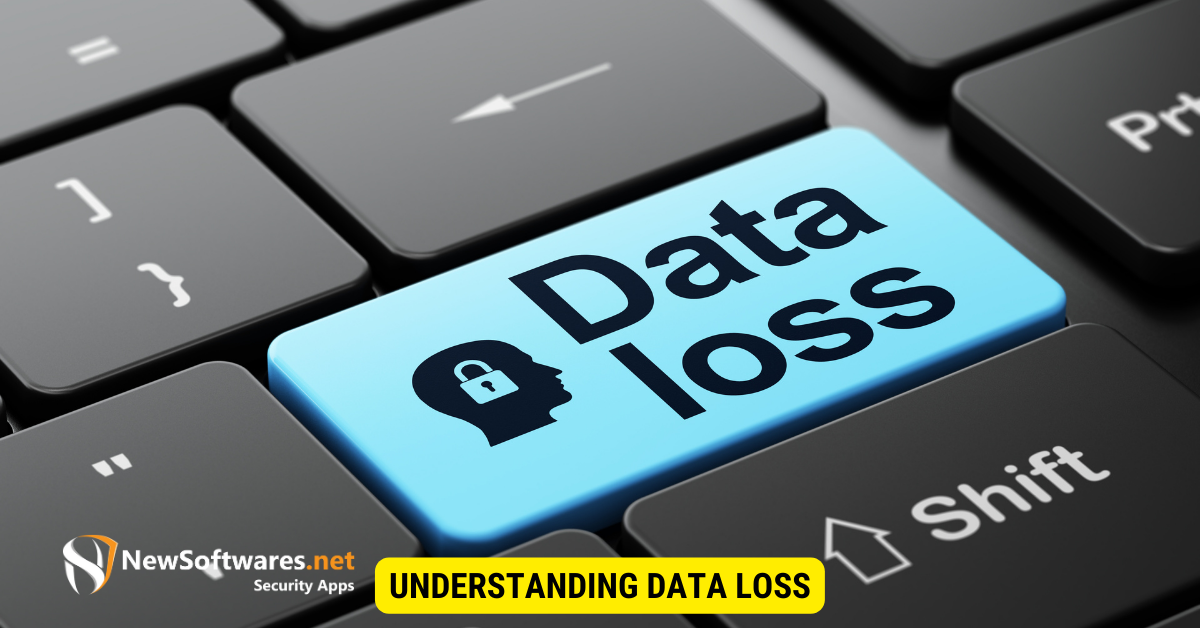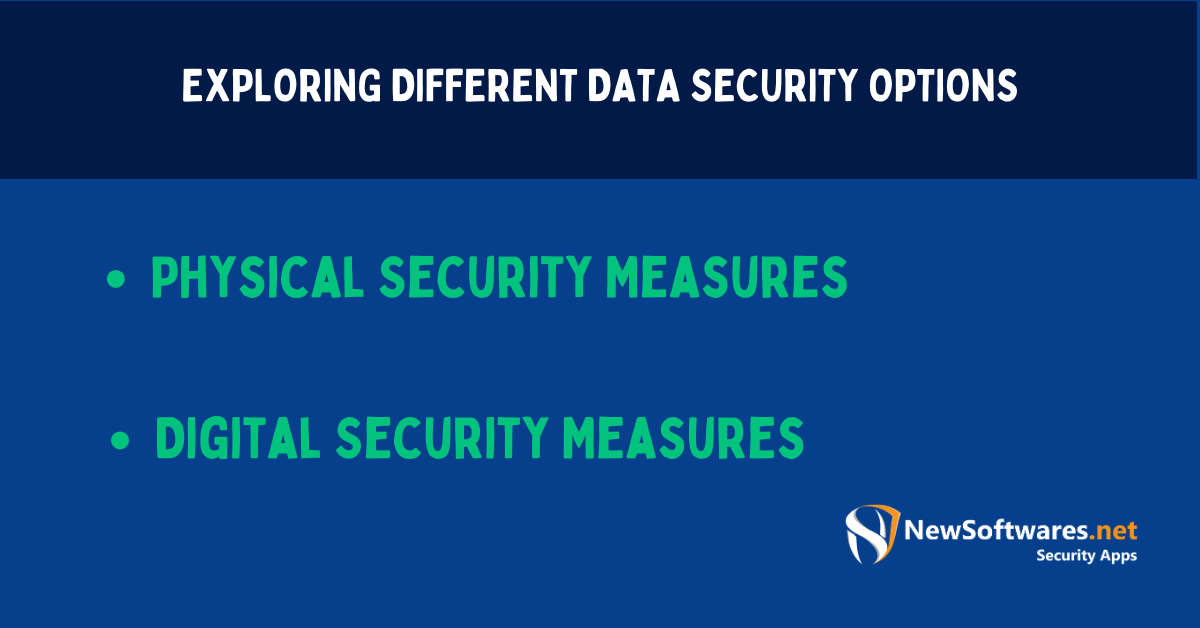Providing the greatest security against data loss generally involves a combination of regular backups, encryption, multi-factor authentication, and secure storage solutions.
Data loss is a major concern for individuals and businesses in today’s digital age. The loss of important data can have severe consequences, ranging from financial loss to damage to reputation. Therefore, it is crucial to understand the different data security options and determine which provides the greatest protection. We will realize the concept of data loss, the importance of data security, various data security options, and ultimately identify the most effective option against data loss.
Understanding Data Loss

Data loss refers to the unintentional or accidental destruction, deletion, corruption, or loss of data. It can happen for many reasons, such as hardware failure, software malfunction, human error, cybersecurity breaches, or natural disasters. Whether it’s personal files, customer databases, or valuable intellectual property, the consequences of data loss can be devastating.
Data loss is a pervasive issue that affects individuals and businesses alike. The loss of critical information can disrupt operations, lead to financial losses, damage reputation, and even result in legal consequences. Therefore, it is crucial to understand the common causes of data loss and take proactive measures to prevent it.
Defining Data Loss
Data loss can take many forms, each with its implications. One common type of data loss is accidental deletion, where important files or folders are mistakenly removed. This can happen when a user mistakenly selects the wrong files to delete or when a software glitch causes unintended deletions.
Another form of data loss is data corruption, where the integrity of the data is compromised. Corruption can happen due to various factors, such as software bugs, hardware malfunctions, or power outages during data-writing processes. When data becomes corrupted, it may become unreadable or unusable, rendering it effectively lost.
Hardware failure is another significant cause of data loss. Hard drives, solid-state drives, and extra storage devices can fail due to mechanical issues, electrical problems, or wear and tear over time. When a storage device fails, it can result in the loss of all the data stored on it unless proper backup measures are in place.
Common Causes of Data Loss
Individuals and businesses should be aware of several common causes of data loss. Hardware disasters, such as a hard drive crash or a power surge, can result in the loss of data stored on the affected device. This can be particularly devastating if there are no backups available.
Additionally, human error is a leading cause of data loss. Accidental deletion or formatting of data can happen when users mistakenly click on the wrong files or initiate actions that result in losing important data. It is essential to exercise caution and double-check before performing any actions that could potentially lead to data loss.
Cybersecurity breaches pose a significant risk to data security. Hacking attempts, malware infections, or other cyber attacks can compromise sensitive data and lead to its loss or unauthorized access. Implementing robust security measures, such as firewalls, encryption, and regular software updates, is crucial to mitigate the risk of data damage due to cyber threats.
Lastly, natural disasters like fires or floods can destroy physical data storage devices and result in irretrievable loss. When physical infrastructure is damaged or destroyed, recovering data becomes extremely challenging. It is important to have off-site backups or cloud storage solutions to ensure data survivability in the face of such disasters.
By understanding the various causes of data loss, individuals and businesses can take active steps to protect their valuable information. Implementing regular backups, utilizing secure storage solutions, educating users about best practices, and investing in robust cybersecurity measures are all essential in mitigating the risk of data loss. Remember, prevention is always better than trying to recover lost data.
The Importance of Data Security
Data security is critical for businesses, regardless of their size or industry. In today’s digital age, where information is constantly shared and stored, protecting sensitive data has become more crucial. Business data often includes highly confidential information such as financial records, customer details, and proprietary information. Therefore, an effective data security strategy is vital to safeguard this valuable information from unauthorized access, misuse, or theft.
One of the primary reasons why data security is essential for businesses is to maintain the confidentiality of sensitive information. Breaches in data security can result in unauthorized individuals gaining access to confidential data, leading to severe consequences. For instance, financial records falling into the wrong hands can result in financial losses for the business and its customers.
Furthermore, data security plays a crucial role in maintaining the integrity of business data. Ensuring that data remains accurate, consistent, and reliable is essential for making informed business decisions. Without proper data security measures, there is a risk of data being tampered with or altered, leading to incorrect information and potentially disastrous consequences for the business.
Another significant aspect of data security is ensuring the availability of data. Businesses rely heavily on their data to carry out day-to-day operations, make strategic decisions, and provide efficient customer service. Any disruption or loss of data can harm business operations, leading to delays, financial losses, and a decline in customer satisfaction. Therefore, implementing measures to protect data from loss or corruption is crucial to ensure the continuous availability of data.
The Role of Data Security in Business

Data security plays an essential role in the success and longevity of businesses. By implementing robust data security measures, businesses can protect their competitive advantage and maintain customer trust. In today’s highly competitive marketplace, where data breaches are becoming increasingly common, customers are more cautious than ever about sharing their personal information. Therefore, businesses prioritizing data security and establishing their assurance to protect customer data are more likely to gain a competitive edge.
Moreover, data security is essential for protecting sensitive information from external threats and internal risks. Insider threats, such as disgruntled employees or accidental data breaches, can pose significant business risks. Implementing data security measures, such as access controls, encryption, and monitoring systems, can help mitigate these risks and ensure that data remains secure from external and internal threats.
Additionally, data security is crucial for businesses operating in regulated industries. Many industries, such as healthcare and finance, have stringent data protection regulations to safeguard sensitive information. Failure to comply with these rules can result in severe penalties, legal liabilities, and damage to the business’s reputation. By implementing robust data security measures, businesses can safeguard compliance with these regulations and avoid potential legal and financial consequences.
Potential Consequences of Inadequate Data Security
The consequences of inadequate data security can be severe and far-reaching. A data breach can overwhelmingly affect businesses, both financially and reputationally. The financial losses incurred due to a data breach can be substantial, including costs associated with investigating the breach, notifying affected individuals, providing credit monitoring services, and potential legal settlements. These financial implications can cripple a business, especially smaller organizations that may not have the resources to recover from such a breach.
In addition to financial losses, inadequate data security can lead to significant legal liabilities. Businesses may face lawsuits from affected individuals or regulatory bodies depending on the nature of the data breach and the applicable laws. These legal battles can be lengthy and expensive and tarnish the business’s reputation, further exacerbating the damage caused by the data breach.
Furthermore, a data breach can have a detrimental impact on the reputation of a business. Customers value their privacy and trust businesses to protect their personal information. When a data breach occurs, customer trust is shattered, and it can take considerable time and effort to rebuild that trust. The negative publicity near a data breach can also deter potential customers from engaging with the business, resulting in a loss of revenue and market share.
Regulatory penalties and fines are another potential consequence of inadequate data security. Many countries have endorsed data protection laws requiring businesses to implement appropriate security measures to protect personal information. Failure to comply with these instructions can result in significant penalties and fines, which can further strain the financial resources of a business.
Moreover, the recovery process after a data loss incident can be time-consuming and may not guarantee full data retrieval. Businesses may need to invest in forensic investigations, data recovery services, and system upgrades to prevent future breaches. The costs associated with these activities can be substantial and can have a long-lasting impact on the business’s financial stability.
Given the potential consequences of inadequate data security, investing in robust data security measures is essential for mitigating these risks. By implementing a comprehensive data security strategy, businesses can protect their sensitive info, maintain customer trust, comply with regulations, and safeguard their reputation and financial stability.
Exploring Different Data Security Options

Physical Security Measures
Physical security measures protect data by securing the physical infrastructure where it is stored. This can contain access controls, surveillance systems, locked cabinets, and data backup in secure off-site locations. While physical security measures are important, they may not provide sufficient protection against all types of data loss, particularly digital threats.
Digital Security Measures
Digital security measures focus on protecting data from cyber threats, such as hacking, malware, and data breaches. These measures include implementing firewalls, intrusion detection systems, secure network protocols, and encrypting sensitive data. Systematic software updates and patches are also critical to address known vulnerabilities. While digital security measures are essential, they may not always protect against physical threats or accidental human errors.
Evaluating Data Security Options
Criteria for Evaluating Data Security Options
When evaluating data security options, several factors should be considered. These include the level of protection provided, ease of implementation, scalability, compatibility with existing systems, cost-effectiveness, and compliance with relevant regulations. Each organization’s unique requirements and risk profile should guide the selection process.
Pros and Cons of Different Data Security Options
All data security options have their advantages and disadvantages. Physical security measures provide a tangible sense of control and can safeguard against physical threats. However, they may not protect against sophisticated digital attacks. Digital security measures offer robust protection against cyber threats but may not address physical vulnerabilities or human errors. Finding the right balance between these options is crucial for comprehensive data security.
The Most Effective Option Against Data Loss
Why This Option Stands Out
After careful evaluation, it has been determined that a combination of physical and digital security measures provides the greatest protection against data loss. By integrating both approaches, organizations can address a wider range of threats, minimize vulnerabilities, and enhance overall data security. Physical security measures protect against physical disasters and unauthorized physical access, while digital security measures defend against digital threats and accidental human errors.
Implementing This Option in Your Business
A comprehensive data security strategy requires careful planning and investment in appropriate tools, technologies, and training. Organizations should assess their security needs, consult experts, and develop a customized approach incorporating physical and digital security measures. Regular monitoring, maintenance, and updates are essential to ensure the ongoing effectiveness of the data security strategy.
Key Takeaways
- Regular backups are essential for recovering lost data.
- Encryption helps secure data at rest and during transfer.
- Multi-factor verification adds a layer of security.
- Using a reputable storage solution can offer robust security features.
- A multi-layered approach is often the most effective.
FAQs
Is backup alone sufficient for data loss prevention?
No, backup is just one part; other measures like encryption and multi-factor authentication are also necessary.
What is multi-factor authentication?
Multi-factor authentication requires two or more verification methods: something you know (password), something you have (mobile device), or something you are (fingerprint).
How often should I back up my data?
This varies depending on the data’s importance, but ideally, backup should be performed regularly to minimize loss.
Is cloud storage secure for backups?
Generally, it depends on the provider’s security measures, like encryption and data center security.
Can encryption slow down data access?
While encryption can add some overhead, modern systems generally handle it efficiently enough that the slowdown is negligible.
Conclusion
In conclusion, the question of which option provides the greatest security against data loss is best answered by adopting a multi-faceted approach. Combining physical and digital security measures allows organizations to address a broader range of threats and minimize the risk of data loss. While no strategy can eliminate the possibility of data loss, implementing a robust data security strategy significantly enhances protection and reduces potential consequences. By prioritizing data security and implementing the most effective option, businesses can mitigate the risks associated with data loss and ensure the safety and integrity of their valuable information.
